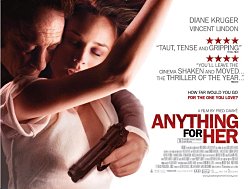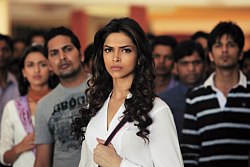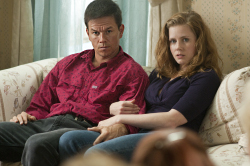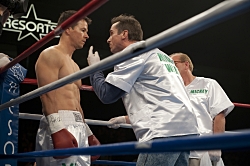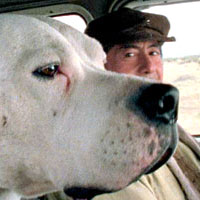Could you describe your career to date leading up to this, your first feature film?
Popular on LondonNet
There are two stages in my career. I wanted to make films for a long time, but had to wait for things to fall into place to make it possible. I don’t come from a filmmaking background. If, as a twenty-year-old, I’d told my mum that I wanted to be a director, she’d have had me locked up!
For ten-or-so years I was a photographer, but I was always interested in telling stories. I started by writing screenplays for short films. They did pretty well and one, J, picked up a lot of awards.
At the same time, I was writing for television, and then for other directors. But I never let go of the idea of becoming a director myself; I never wanted to get pigeon-holed as a screenwriter. I considered myself first and foremost a director, just then working as a screenwriter. Actually, as I see it, directing starts in the writing. It’s a stage I need to go through. When I write, I’m already thinking of how the scenes will fit together in the editing.
And then, everything just happened all at once. I met with producer Eric Jehelmann, and we decided we wanted to work on a project together. My co-screenwriter Guillaume Lemans and I came up with an idea that we liked. Everything happened very quickly. The script was finished by October 2006; Vincent Lindon signed on immediately, and we tailored the role slightly in accordance with how he imagined his character.
How did you have the idea for ANYTHING FOR HER?
Guillaume Lemans had the original idea: a man decides to help his wife, victim of a miscarriage of justice, to escape from prison and to fight against this cruel blow of fate that has separated him from the woman he loves. He has the choice to give in or to fight back and attempt everything possible, even if that means breaking the law, to get back the relationship, the family life, the wife he loves. There’s a quote from Mark Twain that corresponds marvellously with this concept: ‘They did not know it was impossible, so they did it.’
He never doubts his wife’s innocence, but it’s really their love story, and not the miscarriage of justice, that’s at the heart of the film.
Guillaume and I asked ourselves what gives people the courage to act in this kind of situation. Faced with an obstacle, a test, some people take action, and some don’t. I think that it’s only by being in a situation like that that you can really know the true answer to the question. Under the Occupation, some people joined the Resistance, and others – good people too – chose not to. I’d like to think I’d be among those who’d take action, but I can’t know for sure. For Julien, it’s love which gives him the courage to do what he does.
We also developed the screenplay by asking ourselves why Lisa was accused, and how to explain that in the film. Guillaume and I both fed things into the film, often drawing on our own life experiences. We work well together, and to his credit he saw that he would have to let me ‘own’ the film’s concept, take full possession of it, so that it truly became my film. Guillaume and I worked separately to begin with, then compared ideas. I wrote the first draft of the screenplay myself. We complement each other well, and that was the basis of a very fruitful collaboration.
There are themes that run through all directors’ work. For me, it’s the father-son relationship. It’s there twice in this film, in the relationship between Julien and his father, and between Julien and his son.
There are no miracles in this film: everything is plausible, believable – it’s the little mishaps, the mix-ups that ground this story in reality. Did you research real-life prison breaks?
We did some basic research because we were anxious to avoid something too Mission Impossible – we wanted to retain the feeling that this is an amateur, an ordinary guy, who doesn’t even know how to go about getting forged documents. I asked myself what I would do, and realised that the only ‘gangsters’ I know are the cigarette traffickers at the Barbès metro station! The visible face of the underworld are its foot-soldiers, its lowliest members.
At every moment, at every stage in the film we knew there was a limit we were not to cross if we were to remain credible, but of course at the same time, we were making a movie. When Vincent Lindon picks up a gun, he can’t just pick it up any-old-how, even if his character is just an ordinary guy. This was the great challenge for the film, and Vincent met it admirably by bringing both strength and fragility to the role.
Did you write with an actor in mind?
To begin with, we didn’t have anyone special in mind. But then as we developed the character of Julien, our vision became more focused. I saw him as comfortably-off, over-40, so that the idea of starting over would be more difficult. Vincent came quickly to mind. He makes a good ‘Mr Average’ but also has great charisma, so that immediately you feel for him. He’s also a very physical actor, and actually I’m surprised that we don’t see him in more roles that make use of this ability.
How did you approach him?
We offered him the role and he said yes very quickly. We met up one Friday morning before his flight to New York. He read the first half of the script on the plane and rang me. He was already completely caught up, involved in the story. I was on tenterhooks waiting for his reply. If he agreed, then that would be a huge coup for me on my first film. He called me up on Monday morning to say yes, and give me a few ideas to look into. We really found we have a lot in common. We are a lot alike in some ways: we share the same worries, the same need for clarity, precision. He is amazingly involved as an actor. Even when he’s got his back to the camera, he plays it as if he were face-on! He even acts when he’s off-screen. He’s just a joy to work with.
How did you choose Diane Kruger?
It wasn’t an easy decision. Diane is a very beautiful woman, but that’s not the thing that the role makes most of. I wanted someone really luminous, so that her descent into hell would be all the more striking. Diane is so lively, so seductive, that to see her wilt, lose courage is all the more impressive. Before she signed on, she wanted to meet me to see in what direction I wanted to take her character. Luminous at the start, I wanted to see her lose courage, but then find it again. Lisa had to be a kind of sun, to be a strong character. That’s how I imagined it, and that’s what we worked on, Diane and I. In the scenes of high-emotion, the scenes with the child, she is really terrific. Several times, she even had the crew in tears… It was her understanding of the part that provided the idea of having Lisa on the telephone receiving the news that she’ll not be getting out of prison. It wasn’t in the script, and in fact, now I have to ask myself why! She didn’t want her character to be someone who dissolves quickly into tears. She’s not a weak woman, she’s a broken woman, cut off from all that she loves. When she refuses visits from her son, that’s proof of an enormous strength of character. You can understand that her husband is nuts about her. Diane incarnates that to perfection.
How did you find the child?
Working with a child is always difficult, to begin with because of the regulations that have to be complied with, because of their age. Initially I wanted a five-year-old child, but that just wasn’t going to happen with their being able to work just two hours a day. So I settled on a six-year-old who seems younger, shier. At the casting call, all children are shy. Once you get to know them, they’re much less shy! We saw fifty children and chose Lancelot Roch, who also looked a bit like Diane. He has the same light in his eyes. He’s terrific. He got along well with Vincent.
The secondary characters are unusual in French cinema for being strong, immediately understandable, absolutely not caricatures. Was this the result of a deliberate choice, or just instinctive?
From the start, the idea was to go for a heightened reality. This ‘Mr Average’ character has to be credible, but he’s also a character in a film. We never wanted to overstep the mark, and become implausible. When Vincent comes up against the bad guys, he has to correspond to the image we have of an ‘ordinary guy’ and they to our idea of ‘bad guys’. This helps with audience identification, as the audience have to identify with Vincent. We saw lots of actors because they didn’t just have to ‘look right’, they also had to be good actors. Thanks to my great casting director, I’m pleased with the final result. Whether it’s Olivier Marchal as the multiple escapee, Olivier Perrier as the father, Liliane Rovère as the mother or Moussa Maasktri as the trafficker, all manage to bring their characters to life with very few scenes. I have to mention Hammou Graia as the superintendant. I had imagined the character as a cross between Lino Ventura and Darth Vader! Hammou is an imposing figure: just to see him on screen, you start imagining everything he knows, everything he’s seen and you understand that people he approaches obey him. I really thought hard about how to direct people in each role, even the secondary ones. It was essential to tell them the story of each character so they understood how they fitted into the action. And then, each actor worked hard individually and, once they understood the role, it was just about striking the right balance, bringing everything into harmony. All that happens at the writing stage already. The actor knows things about his character that I don’t, and the character of Julien played by somebody other than Vincent would have been different. I took the actors personalities into account, used what each brought to their part.
How did you work with your actors?
I started with extremely detailed read-throughs with Vincent, where we really discussed everything. Every time he put his finger on something that I couldn’t justify, Guillaume and I went back to the screenplay to tighten things up. These revisions were enormously useful later on because all we had left to do then was give the character a bit of direction.
We did the same re-writing job on Diane’s character. Ideas popped up at these sessions. It had to work like this so that by the time we got on set, everyone was in agreement. Then we did read-throughs with Diane and Vincent. We did the first read-through the day of the screen tests, and it was magic. You could believe in them as a couple straight away.
During these rehearsals we cut out a lot of the script. In the end, the film has relatively little dialogue which actually does nothing to weaken the emotional impact of the piece, in fact quite the opposite. The best actors just act – they don’t need great long speeches! The scene in the hospital after Lisa’s suicide attempt is typical in this regard. It had a lot of dialogue originally. After several cuts, we ended up with a sequence that is completely dialogue-free, but all the more meaningful for it. All Diane has to do is close, then open her eyes to explain how she’s feeling. And there, we touch on the essence of cinema.
Writing the screenplay, were you impatient with some scenes, dreading others?
I actually turned forty during the shoot, and as luck would have it, it was on my birthday that we shot, for me, the film’s most important scene where Julien falls apart, where he reaches his limit. That was a tough scene. Vincent had to retain the character’s essential coherence, even in this violent situation. When he pulls a gun on the dealer, you’ve got to feel how scared, how awkward, he is. The dealer sees it, and everything rises in a crescendo. Julien will never be the same again. Even if his reasons have nothing in common with those of a gangster, he becomes an outlaw.
His wife is innocent, but he becomes guilty. This question of how far one will go for the woman one loves touches on one of the subjects that interested me most from the start, that is, how much bad can one do in the cause of good? The moment where we stop supporting this character should be felt in the film.
How did the shoot go?
We did all the scenes in the studio and those in prison in chronological order. The first scene where Vincent and Diane appear together is the breakfast scene. The love scene in the lift was shot later so that they didn’t have to kiss on the first day!
For Diane, shooting in chronological order was important because her character still has hope. Diane and Vincent worked well together. Just as people, we got on straight away. Vincent is sincere, positive, engaged. He makes sure you leave nothing to chance, and he really pushed me to fully develop my ideas! All his comments were entirely justified. He has a knack for identifying exactly what it is that’s not working. That’s a great attribute. Greater still, he knows when to trust you and stop arguing. He’s not looking to be in charge. There’s no ego thing in his attitude. He’s just looking for coherence. I was enormously lucky to work with him.
Perhaps because I’d wanted to make one for so long, I never had the feeling I was working on my first feature. I didn’t worry like I was told I would. First I was worried I wouldn’t make this film, but as soon as I got started, my fears vanished. I didn’t want it to look like a first film, and I worked at each stage as if I’d never get a second chance!
The shoot took eleven weeks, in Paris, mainly. A little bit in Belgium and a little in Spain, which stood in for Latin America. The prison interiors – the cell, the visiting rooms – were shot in a studio. The corridors were shot in the National Library of France. The exterior was the prison in Meaux.
I also wanted to show a different Paris from the one we are generally shown on screen. We avoided the big nineteenth-century apartment blocks and went for things a bit more confined looking, in keeping with Vincent’s character. Not too much green space, not too much sky. Paris in this film could be any other big city.
I worked hard, but I was also surrounded by a very talented team of people: Alain Duplantier, DP, Philippe Chiffre, head of production design… I didn’t just choose them for their experience, but also for their qualities as people. I have to mention Benjamin Weill, our editor. His help at the editing stage was vital. He understood completely the rhythm and density of narration I’d imagined. He put everything into this project. The whole team bought into this film fully.
For the soundtrack, you worked with Klaus Badelt, a composer much sought-after in Hollywood…
I was very fortunate to work with such a big name on a first film. Not only has he worked with Terrance Malick and Michael Mann, but this was also the first time he’d written music for a French film. He liked the script, and agreed to do it.
On a personal level, he is just a joy to work with. He arrived quite late-on in proceedings and watched the film just to see where we needed music, and where we didn’t. His music never underlines the intensity or emotion of a scene – it is part of that intensity and emotion, and just carries things to the next level. Klaus said that the film worked without music, but with his additions I find that I reconnect with the emotions I felt as I was writing the screenplay. His music encapsulates and conveys all the notes scribbled in the margins of the screenplay. Suddenly, it’s as if the stage directions were written into the image. The fact that we were so short on time made us focus on essentials. Klaus is entirely without ego: he puts himself at the service of the film, contributes everything he can to the narration. We recorded at Abbey Road with first-rate musicians; I have to be honest, it was a real kick to watch four violinists playing the film’s theme tune there, in front of me.
Today, what are you most proud of? What have you learned about yourself?
In every-day life, I’m a worrier; the set is the only place I’m not. Paradoxical but true! The first day I arrived on set as if it were my 800th! This experience just confirms me in my love of the job.


